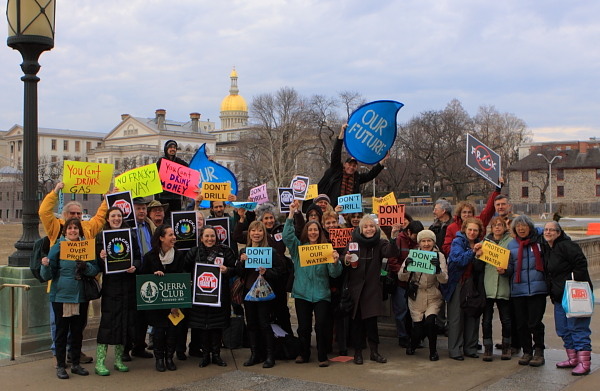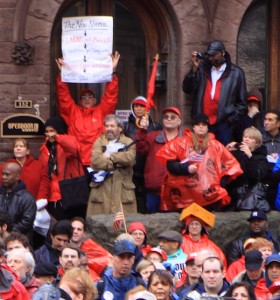
Clean water advocates oppose fracking at DRBC hearing – NJ State Capitol in background
[Update 3 – 3/4/11 – check out the fracking photos on this site!]
Update 2: 2/28/11 – Propublica provides a useful readers guide as the debate heats up]
Update 1: 2/28/11 – We helped with this superb NY Times piece: Regulation Lax as Gas Wells’ Tainted Water Hits Rivers]
Today, the Delaware River Basin Commission (DRBC) held the 3rd of 3 public hearings in Trenton NJ on controversial draft regulations that would end the current moratorium on “fracking” natural gas wells in the Delaware River basin (see this for DRBC draft rules and public comment process).
The DRBC rules would allow deep vertical well drilling and horizontal “fracking” at thousands of sites to extract natural gas from shale formations that underlie large portions of the Delaware River Basin, a small part of the Marcellus shale formation.
“Fracking” is a controversial new gas drilling technology that injects millions of gallons of toxic chemicals, under high pressure, deep underground to fracture rock formations to extract natural gas deposits (for useful background info, read the outstanding series by Propublica, or watch the award winning documentary “Gasland“, or see this and this and this and this).
The controversial “fracking” practice was exempted from federal environmental laws in 2005, during the Bush Administration, based upon corrupt political pressure organized through Vice President Cheney’s energy industry dominated and secret Energy Task Force.
Since then, the gas industry has engaged in a gold rush mentality, with States trying to catch up and put in place adequate safeguards to protect critical drinking water supplies.
State regulatory efforts are being controlled by big monied special interest lobbying. The gas industry is relying on false promises of jobs, energy royalty payments, and rural economic development, which are powerful temptations during the current deep economic recession and local and state fiscal crises.
State’s are desperately eager to attract short term economic exploitation. They foolishly are welcoming the gas industry with open arms, relaxing regulations on drilling on state lands, and minimizing economic royalty payments.
NJ Governor Chris Christie’s representative on the DRBC, retired energy consultant and now DEP Commissioner Bob Martin, has emphasized the economic potential of Marcellus gas reserves and supports fast tracking gas development. Martin is attempting to strong arm DRBC into relying on the primacy of State level regulations, which are dominated by the gas industry and woefully inadequate.
As far as I could tell, Martin did not even send a representative to tonight’s hearing – how’s that for arrogance?
This is the same NJ Governor who talks a lot of BS – and gets credit by the press and some co-opted environmentalists – for “killing” off shore LNG development, while at the same time that he supports new gas pipelines across NJ’s most sensitive forested lands, provides sweatheart deals for gas pipeline easements across state parks and water supply watershed lands, and aggressively undermines strong DRBC regulation of fracking:
The administration of New Jersey Gov. Chris Christie, the only Republican governor in the group, is pressing the commission to hurry up and allow drilling in Pennsylvania. In a July letter to Collier, Bob Martin, the head of Christie’s Department of Environmental Protection said DRBC should not use its authority to impose stricter water quality standards than Pennsylvania, which would reduce New Jersey’s influence over water quality decisions regarding the Delaware.
“New Jersey does not believe DRBC regulations should expand into areas that are under a state’s authority,” wrote Martin, a retired energy consultant.
(and Martin still has failed to fix the underlying DEP lease problems , despite finally admitting a problem exists months ago).
Perhaps Christie and Martin will listen to thousands of New Jerseyans who oppose fracking. If Christie disregards public sentiment, maybe he will listen to a recent letter [link forthcoming h/t Sierra Club], signed by 36 [39] NJ legislators, [opposing the draft rules as premature and not based on science] urging DRBC to slow down and extend the public review process (see this for pending NJ moratorium legislation).
The lure of industry money also has prompted desperate rural local governments, landowners, and farmers to support the practice.
One farmer went so far as to say he opposed ANY DRBC regulations on “his land, and his water”.
It was the hope that the DRBC, a regional body operating under the 1961 compact, would be insulated from these state and local economic and political pressures and act with integrity to provide a strong science based regional plan and regulatory controls. Such controls would include bans on any industrial scale energy resource exploitation that would risk irreversible harms to the Basin’s water resources (and industrialize a largely rural, agricultural, and forested landscape).
That hope has been dashed (unless direct action by advocates can reverse industry influence – there is too much money at stake and it is too late for traditional lobbying).
Simply, DRBC lacks a comprehensive plan and the proposed reactive site specific regulations lack a sound scientific basis or precautionary public policy approach that honors DRBC’s mission to protect the basin’s water resources.
Instead, the DRBC’s pro-gas industry regulations – which would rescind the current moratorium, allow drilling, and therefore promote industry objectives over water resource protection – are being fast tracked in an effort to frustrate effective organization of strong and growing public opposition.
DRBC regulates water resources that supply drinking water to NY, NJ, Pennsylvania and Delaware, yet no hearings were held in Philadelphia and New York, where millions of residents rely on the Delaware for drinking water.
DRBC set a minimal 90 day public comment period, in a rush to put rules in place before public opposition can be organized. Public testimony at the hearing was strictly limited to 2 minutes, hardly time to state your name and briefly introduce your concerns
DRBC draft rules were proposed before scientific studies determine the risks and environmental impacts – US EPA is currently conducting such a study.
The DRBC draft rules did not include an environmental impact statement (EIS) under the National Environmental Policy Act (NEPA) (legal eagle question: are DRBC actions subject to NEPA?).
The DRBC rules did not even attempt to analyze the cumulative inpacts of thousands of individual wells, each using up to 5 milllion gallons of water each, or the ecological and public health risks of billions of pounds of toxic chemicals, the destruction of thousands of acres of forests and natural resources, or air pollution or greenhouse gas emissions.
The whole process is a sham.
Although the turnout at the hearing was relatively small, advocates did voice powerful arguments in favor on clean water over gas industry profits.
I spoke briefly of the high risks of the new fracking technology and the complete inability of regulations to protect the water resources of the Delaware Basin.
I expressed my sadness, as a former DEP regulator who typically advocates regulation, at the total inadequacy of the regulatory approach.
I also expressed my disgust for the corruption of science and public policy, the anti-democratic nature of the DRBC process, and the ugly power of politics and money.
I urged DRBC to withraw the draft rules and either propose an outright ban, or a long term moratorium until such time as the DRBC is able to put in place a science based comprehensive plan and adequately protective regulations.
The burden to prove that fracking can be done safely is on the gas industry. They have not come close to meeting that burden.
Given the risks and scientific unknowns, it would be recklesss to allow fracking to occur.
Sierra Club, Delaware Riverkeeper, and Food and Water Watch were the NJ/PA based groups leading the activist effort – please reach out in support.
